

The
Research Project
The Study Area
Background Information
Tools Of The Trade
A Day In The Life Of . . .
Tuesday, December 11, 2001
A Country of Diverse People
Even though Ghana has been a country since 1957, the people of Ghana are very diverse and represent a number of different tribes that all speak their own language or dialect. John, George and Samuel all certainly reflect this.
Atingeh John Abugbilla Parker
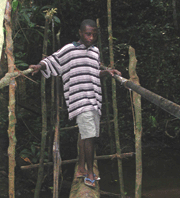 We
call him John but his real name is Atingeh John Abugbilla Parker. Atingeh
refers to the land and Abugbilla is a reference to an ancestral guardian.
John is of the Frafra tribe and his native language is Gurine. Like everyone
else here though, he speaks a number of other languages as well. In addition
to English, John speaks Twi, Dagbani, and Hause. John is from the capital
city of the Upper East region, Bolgatanga.
We
call him John but his real name is Atingeh John Abugbilla Parker. Atingeh
refers to the land and Abugbilla is a reference to an ancestral guardian.
John is of the Frafra tribe and his native language is Gurine. Like everyone
else here though, he speaks a number of other languages as well. In addition
to English, John speaks Twi, Dagbani, and Hause. John is from the capital
city of the Upper East region, Bolgatanga.
After Secondary School John volunteered for the National Service for a year and taught mathematics at the secondary level. Having always been interested in wildlife conservation he attended Forestry school after his year of teaching. This involved years of course work and practical experience in the field. John is very proud to have been top of his class throughout all his course work.
When we asked him why he chose the Forest Service he replied that he has always loved nature in all its forms and wants to help protect it. He has been a patient guide and good companion this past week. It is a marvel to watch him in the field identifying plants.
George B. Issaka
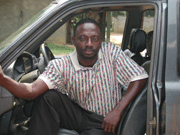 George
is from the village of Takpo in the Upper West region of Ghana. He is a
member of the Dagarti tribe and he speaks, in addition to his native tongue
of Dagart, English, Twi, and a little bit of Awise.
George
is from the village of Takpo in the Upper West region of Ghana. He is a
member of the Dagarti tribe and he speaks, in addition to his native tongue
of Dagart, English, Twi, and a little bit of Awise.
George attended Secondary School but was not able to complete his course work because of financial problems. Remember, school is not free in Ghana. His father decided instead to have him learn to be a mechanic which he did and then he worked as one for 12 years. Afterwards he moved to Accra and became a taxi cab driver.
He applied to the Wildlife Department and in 1992 became a driver for the head of the department until his retirement. George now drives the second in command for Wildlife Development. This man is in charge of research and has released George to work with Lindsay while she is here. But George is more than Lindsayís driver. He helps interpret not only the language but Ghanaian culture as well. Without George, Lindsay would be lost.
Samuel Ndah
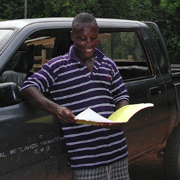 The
man who joins us each time we enter the jungle to protect us is Samuel Ndah,
alias Gyamfi. He has two names because his stepfather, who raised him, was
named Gyamfi. His birth name is Ndah. Samuel was born in the Western Region,
in the eastern part of Nzema via Axime. He is from the Royal Tribe Assuna
and speaks Nzema, English, Twi, Enfante, Anyee, French, and Stwee.
The
man who joins us each time we enter the jungle to protect us is Samuel Ndah,
alias Gyamfi. He has two names because his stepfather, who raised him, was
named Gyamfi. His birth name is Ndah. Samuel was born in the Western Region,
in the eastern part of Nzema via Axime. He is from the Royal Tribe Assuna
and speaks Nzema, English, Twi, Enfante, Anyee, French, and Stwee.
Samuel went to school in Ghana and then wanted to see the world. He traveled to Cote díIvore, Mali, Mauritania, and Nigeria. During this time, he was a bartender, business owner, and farmer. He moved back to Ghana and entered the Wildlife Department. During wildlife training, he did jungle warfare training. He was the best in weapon training, so that is how he became a guard. Since then he has assisted many researchers, but Lindsay is the first one that has actually asked him to help with research.
Elephant Signs Turn Into Elephant Sightings
At last the forest elephants have been seen! Lindsay and Samuel actually saw them this morning while on a monkey transect. Of course, we opted to sleep in this morning and missed it all!
They were both so excited when they returned to camp. Apparently, they had heard the elephants along side the trail. Finally they spotted one through the trees. Samuel crouched down and started to creep nearer. Lindsay, afraid to get any nearer to the elephants but more terrified to get left behind, dropped down and followed him closely. They sat there hunched together in the forest and watched as these huge animals passed by.
Lindsay said they could hear the snorting noises the elephants make when they blow air out of their trunks and of course they could smell them. What amazed them both is that once the elephants had passed by, Lindsay and Samuel could no longer hear them move through the forest. Apparently it is true that forest elephants are able to move almost silently through the trees.
Monkeys, Monkeys, Monkeys—Or So They Say
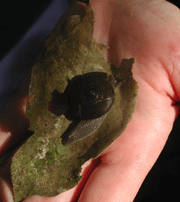 After
missing the elephants in the morning we did go out with Lindsay for the
evening transect. At one point we heard monkeys above us in the trees. While
all of us could hear them, only Lindsay actually saw them—one Olive
colobus and a spot-nosed. The rest of us just saw trees moving overhead
and shadows jumping from one tree to the next!
After
missing the elephants in the morning we did go out with Lindsay for the
evening transect. At one point we heard monkeys above us in the trees. While
all of us could hear them, only Lindsay actually saw them—one Olive
colobus and a spot-nosed. The rest of us just saw trees moving overhead
and shadows jumping from one tree to the next!
Other than the resident duikers we havenít had much opportunity to photograph wild animals because we just havenít seen them. That doesnít mean they arenít here and that we havenít seen evidence of them as we certainly have. Forest animals are generally secretive and many are nocturnal, making daytime encounters difficult.
A Sit Down Meal
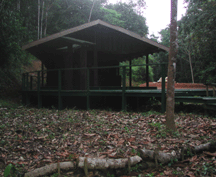 After
finishing our transect the trail came out on the road at a place where a
new restaurant is being built for tourists. It is part of the overall Reserve
development plan to bring eco-tourism to this area. The restaurant itself
is a rather nondescript building but all around it are wooden decks with
steps and platforms all the way down to the river.
After
finishing our transect the trail came out on the road at a place where a
new restaurant is being built for tourists. It is part of the overall Reserve
development plan to bring eco-tourism to this area. The restaurant itself
is a rather nondescript building but all around it are wooden decks with
steps and platforms all the way down to the river.
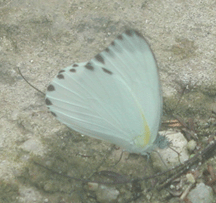 As
we were standing on the bridge that spans the river we spotted a five-foot
brown snake resting on the rocks below. We watched as he slithered off the
rock into the water and swam gracefully away. We also saw swarms of butterflies
taking advantage of the last hours of daylight.
As
we were standing on the bridge that spans the river we spotted a five-foot
brown snake resting on the rocks below. We watched as he slithered off the
rock into the water and swam gracefully away. We also saw swarms of butterflies
taking advantage of the last hours of daylight.
Michael had chosen not to join us on the afternoon transect and instead, to stay back at camp and make us a picnic dinner. He and George showed up shortly after we arrived at the restaurant with a two-course meal of sautťed cabbage and spicy rice with peanut sauce (made from peanut butter). It tasted delicious as we sat around on the wooden decking while the sun set and enjoyed the meal.
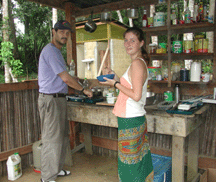 It
was the first time since we have been here that we all got to sit down at
the same time to eat. There is no table and there are no chairs at camp.
At mealtimes we all stand around with our plates in our hands to eat. Additionally,
dinner is almost always eaten in the dark. Tonight was a delightful change.
It
was the first time since we have been here that we all got to sit down at
the same time to eat. There is no table and there are no chairs at camp.
At mealtimes we all stand around with our plates in our hands to eat. Additionally,
dinner is almost always eaten in the dark. Tonight was a delightful change.
Just shortly after we all got in the truck George started shouting suddenly, slammed on the breaks, and jumped out the truck slapping his back. He violently pulled off his shirt and plucked an ant off his back that must have crawled on him while we were dining. While no doubt it hurt, it was funny and it is good to know that the locals donít ever get use to the ants either. They hurt when they bite no matter how long you have lived here!
Afterwards we drove the bumpy road into Elubo so that Lindsay could photocopy some papers for Samuel. At the gas station just outside of Elubo a lorry (flatbed truck) pulled up to drop passengers off and pick up new ones. Not many people can afford cars here so traveling in the back of a lorry is common. They looked precarious with all their belongings loaded in the back and just a short railing around the bed of the truck to keep people from falling out.
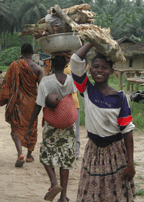 One
of the passengers who got off was woman with a small child. Once on the
ground she picked the child up and placed him on her back, piggyback. She
then carefully wrapped two pieces of cloth around the back of the child
and tied them in front of her to keep him secure. After securing him, she
coiled up another piece of cloth and placed it on her head. With one smooth
motion, she bent slightly forward, and keeping her head straight so as not
to drop the coiled cloth, she placed the large bundle on top of her head.
From her pocket she handed her child what looked to be another small piece
of cloth that he promptly put to his mouth for comfort.
One
of the passengers who got off was woman with a small child. Once on the
ground she picked the child up and placed him on her back, piggyback. She
then carefully wrapped two pieces of cloth around the back of the child
and tied them in front of her to keep him secure. After securing him, she
coiled up another piece of cloth and placed it on her head. With one smooth
motion, she bent slightly forward, and keeping her head straight so as not
to drop the coiled cloth, she placed the large bundle on top of her head.
From her pocket she handed her child what looked to be another small piece
of cloth that he promptly put to his mouth for comfort.
As if the child on her back and the bundle on top of her head were not enough, she then picked up another package with one hand and a three foot cassava root with the other and walked gracefully off into the night, towards home. Watching her in silence, we were all in our own way comparing our lives to what we imagined to be hers. Sometimes the difference is too great to fully comprehend.
Coconut Oil
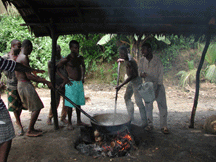 On
our way back we stopped at a coconut oil processing ďplantĒ. We always know
when we are near one as the odor is very strong and pungent. The plant consisted
of a roof made of palm thatch and poles to hold up the roof. The coconut
husks are ground and then soaked for three days. Afterwards they boil them
and strain them. From this they get coconut oil to sell to local villages.
On
our way back we stopped at a coconut oil processing ďplantĒ. We always know
when we are near one as the odor is very strong and pungent. The plant consisted
of a roof made of palm thatch and poles to hold up the roof. The coconut
husks are ground and then soaked for three days. Afterwards they boil them
and strain them. From this they get coconut oil to sell to local villages.
Overly Ripe
After a week in the jungle we are certainly odiferous. Or, to state it more plainly—we stink. Although we take up to two showers a day some days and we wash clothes almost daily, everything is becoming quite ďripeĒ. Our clothes donít ever completely dry and smell of mildew, our shoes will need to be fumigated when we return, and the sheets we sleep on, should be burned. We have all perfected the technique of sleeping on our backs in order to give our noses access to as much air as possible during the night. To turn over and bury oneís face in the pillow would be certain death at this point.
Additionally, we all have our share of intestinal disorders of one kind or another and an equal share of insect bites. Oddly, the mosquitoes are not bad here. It is the black flies that are brutal. You donít hear or see them but they leave little red welts at best making everyone look spotty. For those of us who bodies react more strongly, they leave large itchy welts that donít go away for days.
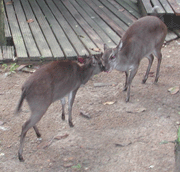 The
presence of the elephants nearby in the forest the last few days has brought
a new kind of flesh eating pest—the marsh fly. If one of these bites
you, you are missing a measurable portion of flesh!
The
presence of the elephants nearby in the forest the last few days has brought
a new kind of flesh eating pest—the marsh fly. If one of these bites
you, you are missing a measurable portion of flesh!
Animal Update
Unfortunately, the woodpecker didnít make it through the night. However, the duikers were reunited this morning and all is well!